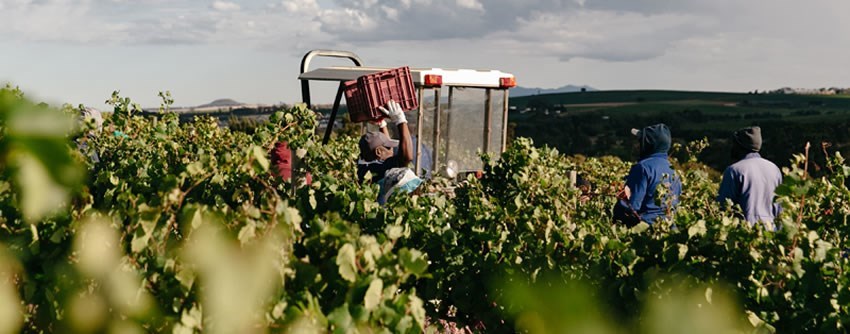What was once a time of year the Stellenbosch community came out in great numbers to celebrate the fruits of their valley with characteristic gees, this year the very promising 2021 harvest is accompanied by fear and uncertainty; the crop a bittersweet reminder that another challenging year looms for our historic town, its wine industry and its people.
It is clear the immediate and devastating short-term effects of South Africa’s alcohol bans and restrictions on sales will linger long after this year’s harvest. The legacy these have left is a wine surplus that threatens the lifeblood of South Africa’s winelands, from Cape Point to the Robertson Wine Valley, from Elgin and the Overberg all the way up the Garden Route.
As one of the biggest contributors to the Stellenbosch community, agriculture and particularly viticulture supports thousands of livelihoods in the growing, manufacturing and related tourism and hospitality value chains, not to mention its invaluable role in building the image of South Africa internationally.
As the top wine tourism destination in Africa, Stellenbosch celebrates another bittersweet milestone this year, the 50th anniversary of the Stellenbosch Wine Route. That should be reason enough to celebrate, but the restrictions have left devastation in their wake – restaurants and wine farms, which rely heavily on wine tourism for cellar door sales, are particularly affected due to the blanket ban in wine sales and curfew.
For some, this means temporary closure as it is simply not financially viable for them to run. For others, it has already meant permanent closure and jobs lost.
There is no other way to describe it – we are fighting for our survival as we survey the staggering volume of grapes that hang on the vines of our beautiful valley, waiting to be picked.
We know we have no space in our cellars to make way for the 2021 harvest and grow anxious at the livelihoods that now hang in the balance, not only those of the workers who are directly involved in wine production but the workers whose industries are supported by it.
While we should be rolling up our sleeves to harvest, we’re back to pouring our efforts into feeding a community which is hungry, jobless and scared – the collateral damage that has been caused by Government’s efforts to balance lives and livelihoods.

As we seek to bring the pandemic pendulum back into balance, we know that some form of restriction is necessary to curb the spread of COVID-19, that removing everything will contribute to the super-spreading events that are the real cause of the pandemic’s pervasiveness.
We support intelligent restrictions that foster responsible drinking, as suggested by Western Cape Premier Alan Winde. However, in terms of saving livelihoods and businesses, we ask that alcohol sales be permitted at wine farms on the weekend, as this is the time when most visitors come to wine farms. These sales are critical for the survival of wine tourism in our town and in the province. Similarly, we ask that on-site consumption of alcohol be allowed. If restaurants can’t sell alcohol with dinner service, it isn’t feasible for them to stay open.
As the country’s largest and oldest Wine Route with 105 members, we have always advocated responsible wine drinking and instituted initiatives like Sober Stellies, which rewards designated drivers for their commitment to safe wine enjoyment.
We were also the first destination in sub-Saharan Africa to put World Travel and Tourism Council-approved stringent health and hygiene safety protocols for the wellbeing of staff and guests. As a destination, we continue to put a firm focus on ensuring our tourism eco-system continues to implement these protocols consistently.
Now, while we wait for the next Presidential address, the Stellenbosch community is back to rallying fervently to support economically-vulnerable people living in and around the Winelands with initiatives like Stellenbosch Unite, through which last year we fed 690,000 people with 207,000 litres of soup and 36,800 food parcels. This year, we are raising funds to create hundreds of care packages for our frontline health workers.
Our caring community looks after each other. And when our guests and visitors are ready and able to visit us again, we will be ready to deliver our characteristic hospitality. But when will that be?
It is a crisis of unimaginable proportions, and as we look out on this year’s harvest, with vast volumes of wine still in vats and cellars across South Africa, it’s easy to be overwhelmed by the thought of the year ahead. But we cannot give up – too much depends on the survival of this industry and our communities.